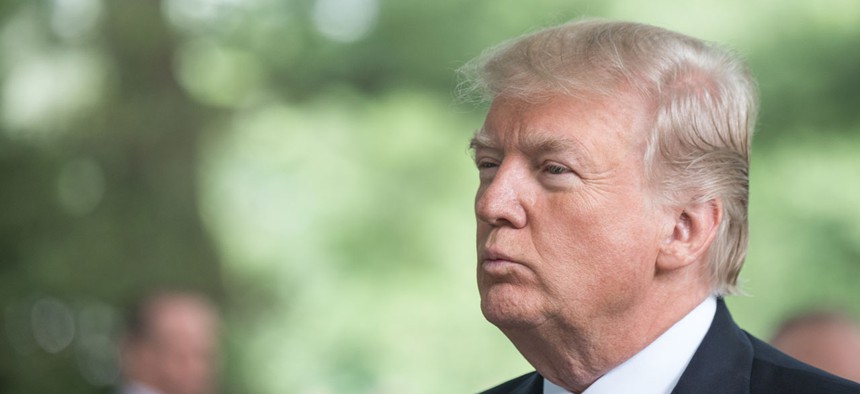
Sgt. James K. McCann/ U.S. Army
Trump: There Are (Probably) No Tapes
The president admits he never had any recordings of conversations with James Comey, but his idle threat has already set off a catastrophic chain reaction.
President Trump said on Thursday that, despite his repeated teases about the existence of recordings of his conversations with fired FBI Director James Comey, he did not make any tapes. But he added a paranoid flourish, nodding toward frequent leaks from the government and his claims of persecution by the intelligence community, by suggesting that recordings might have been made without his knowledge.
In keeping with the increasing sidelining of his communications staff, Trump made the statement via Twitter.
With all of the recently reported electronic surveillance, intercepts, unmasking and illegal leaking of information, I have no idea...
— Donald J. Trump (@realDonaldTrump) June 22, 2017
...whether there are "tapes" or recordings of my conversations with James Comey, but I did not make, and do not have, any such recordings.
— Donald J. Trump (@realDonaldTrump) June 22, 2017
It seemed highly likely that Trump was blowing smoke about the tapes all along. He has, as the AP noted, repeatedly promised to deliver big surprises—such as information proving Barack Obama was not an American citizen—and then failed to do so. Multiple reporters recalled incidents in which Trump claimed to be recording conversations but never produced the tapes, even when claiming he’d been misquoted. Common sense also suggests that no president would be so foolish as to record Oval Office conversations, especially if they involved potential obstruction of justice, given the role of tapes in bringing down President Richard Nixon. Then again, common sense suggests not obstructing justice, and often does not apply to this administration.
Trump’s acknowledgement that there are no tapes was telegraphed earlier in the day. In an Associated Press story Thursday morning, Trump ally Newt Gingrich, the former speaker of the House, was dubious there were any recordings.
“I think he was in his way instinctively trying to rattle Comey,” Gingrich said. He's not a professional politician. He doesn't come back and think about Nixon and Watergate. His instinct is: ‘I'll outbluff you.’”
Later on Thursday, Bloomberg’s Jennifer Jacobs also reported there were no tapes. “Trump raised the possibility of tapes in a strategic fashion to ensure that Comey told the truth, said the person, who spoke on condition of anonymity,” she wrote.
This defense offered by a Trump ally and the anonymous White House official is breathtaking: (1) Trump was actually misleading the public all along and (2) he was doing it in the service of intimidating a witness set to deliver testimony under oath to Congress.
If that was the goal, there’s no evidence that it worked. During his testimony to the Senate Intelligence Committee, Comey recalled waking up in the middle of the night after Trump implied there were recordings and realizing they could vindicate him.
“Lordy, I hope there are tapes,” he said, and later elaborated: “The president tweeted on Friday, after I got fired, that I better hope there’s not tapes. I woke up in the middle of the night on Monday night, because it didn’t dawn on me originally that there might be corroboration for our conversation. There might be a tape.”
But the aide’s explanation is also peculiar because it contradicts the official Trump spin on Comey. On the one hand, the aide says that Trump bluffed about the tapes in order to ensure Comey was honest. On the other hand, Trump’s lawyers have argued since Comey testified that he was actually lying about the substance of their conversations. Both cannot be true.
On June 9, President Trump promised to reveal soon whether he had actually taped his encounters with James Comey, as he had previously implied. He also offered a cryptic caveat: “You're going to be very disappointed when you hear the answer, don't worry.”
With the news that no tapes exist, it is perhaps James Comey who will be most disappointed that there’s no immediate proof of his testimony. (His solace is that in a contest of his honesty vs. Trump’s, there seems to be little question that most people trust the former FBI director more.) Special Counsel Robert Mueller and the members of Congress who had promised to obtain any extant tapes are surely a little bummed as well; any such tapes would have been subject to subpoena. Trump’s legal defense team, however, must be breathing a sigh of relief.
The greatest damage from Trump’s idle threat, however, is already done. Comey told the Senate panel that Trump’s tweet about tapes inspired him to send his memos of conversations with the president to his friend Dan Richman, a Columbia University law professor, who in turn read them to reporters. “My judgment was, I needed to get that out into the public square,” he said. “And so I asked a friend of mine to share the content of the memo with a reporter.”
Those stories led directly to Deputy Attorney General Rod Rosenstein’s decision to appoint Mueller as special counsel. But Mueller is empowered to investigate not just collusion between the campaign and Russia, but any lawbreaking he happens to encounter directly from the course of those investigations, including obstruction of justice. It is the single greatest danger to Trump’s presidency, and he conjured it into existence with a tweet, which he now admits was an idle bluff. The president has bragged about the great power of his social-media presence, but he who lives by the tweet risks dying by the tweet as well.






